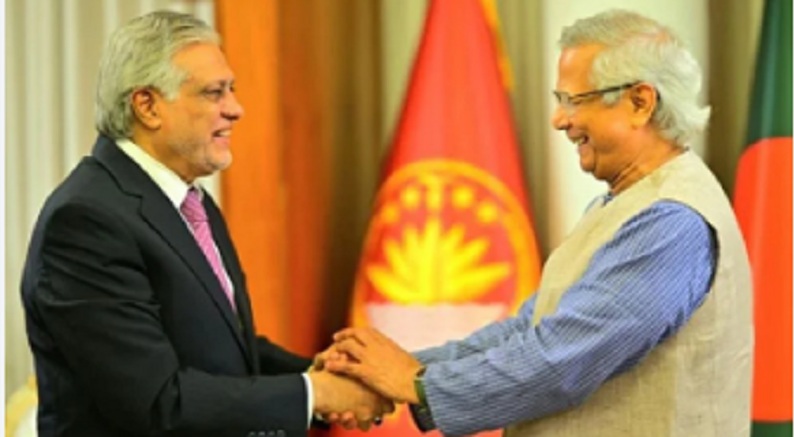There are happy Pakistanis and a clutch of happy Bangladeshis these days. While one can easily surmise how cheered Pakistanis have been by the visit of their foreign minister Ishaq Dar to Bangladesh, one knows too the excitement generated among those in Bangladesh who have never quite forgotten their love for the country they were part of till December 1971.
Include among them the political right-wing in Dhaka, which has never been comfortable with the reality of Bangladesh’s War of Liberation fifty-four years ago.
For these Pakistan-friendly people and political parties, Ishaq Dar’s visit to Dhaka was a joyous occasion. Bangladesh’s people have noted the sheer happiness with which the leaders of the Bangladesh Nationalist Party, the Jamaat-e-Islami and the newly constituted king’s party, styling itself as the National Citizen Party trooped down to the Pakistan High Commission in Dhaka to call on the visiting Pakistani minister.
Where protocol demanded that the visitor meet these politicians at their offices, what happened was the other way round.
It did not occur to these Bangladeshi individuals that meeting a Pakistani minister at the Pakistani diplomatic mission was essentially meeting him on Pakistani territory as defined by the rules of diplomacy.
One is not quite sure what these men discussed with Ishaq Dar, but one can easily understand the meetings all had to do with promoting ‘friendship’ between Bangladesh and Pakistan.
As for Dar’s meeting with his Bangladesh counterpart, the meeting was lacklustre despite the later statement by Bangladesh’s foreign ministry that Dar was presented with demands for an apology over the actions of the Pakistan army in occupied Bangladesh in 1971 and for a settlement of issues related to pre-1971 Pakistan’s assets and liabilities.
Whether the Bangladesh demands carried any weight remains a question, given Dar’s misplaced efforts to convince Bangladesh’s people that Pakistan had, through the tripartite agreement of 1974 and Pervez Musharraf’s later expression of regret, voiced its apology twice over the 1971 genocide.
Ishaq Dar was not speaking the truth. No Pakistani government, since the emergence of Bangladesh as a sovereign state, has ever tendered a formal apology to Dhaka.
Dar was impertinent enough to state, in response to questions by the media, that Bangladeshis should broaden their hearts on the issue since the Islamic religion enjoins upon all Muslims the responsibility of treating one another with a largeness of heart. His words led to severe condemnations of his behaviour among Bangladesh’s people, proof of which was to be had on social media.
For Dar’s hosts, the unconstitutional regime currently holding power on the strength of systematic mob rule, the Pakistani minister’s words were a slap across the face.
One would have thought the Bangladesh authorities would come forth with a sharp response. That response never came.
Neither was there any indication that the Bangladesh foreign ministry had registered its protest with Dar over the recent incendiary statements made by no less than Pakistani Prime Minister Shehbaz Sharif about Pakistan’s current state of ties with Bangladesh being a move to avenge 1971.
In the end, the Dar visit amounted to little in terms of substance. With growing numbers of Bangladesh’s people getting increasingly critical of the Yunus regime over its grave lapses in the past thirteen months, it is obvious that citizens are in little mood to have Pakistan exercise any influence in Bangladesh’s politics.
The destruction of history the Yunus regime has resorted to, indeed the revisionist moves it has initiated to deny the momentous struggle for freedom in 1971, have been leading to conditions where Bengalis are hitting back in a stout defence of the national political heritage.
While Awami League supporters have been getting vocal in these past few months, there is additional good cheer in observing people in general coming together in a defence of Bangabandhu Sheikh Mujibur Rahman and the history of Bangladesh as it was forged in 1971.
Not much, though, is being heard from the elements who have consistently and brazenly claimed that what happened in August 2024 was a revolution.
It was anything but. Where the issue of elections is concerned, there are reasons to think that a good deal more will happen in the country before elections for a new Parliament can be organised.
With demands growing for elections to be free, fair and inclusive, the Yunus regime is in a tight corner given rising public sentiments on the necessity of the Awami League, whose activities have controversially been proscribed by the current regime, to be permitted to participate in the vote.
One does not require much wisdom to understand that any election without the Bangabandhu Sheikh Mujibur Rahman’s party will only exacerbate conditions in the country.
Add to this reality the thought, one based on good logic, that elections under the Yunus regime will not be fair.
And, of course, the regime knows only too well that a credible and inclusive election could well put Mujibur Rahman’s party back in power.
A final point: the BNP has served a show-cause notice on the outspoken Fazlur Rahman, an advisor to the party chairperson lately been vocal in his condemnation of the anarchy and mob rule in the country.
Rahman, a freedom fighter, has refused to be silenced. At the other end, Rumeen Farhana, a lawyer and important public face of the BNP, has been critical of Yunus’ followers. As she notes, her party figures are upset with her stance.
ALSO READ: Despite all-round fascism, hope sustains Bangladesh
The crisis goes on. For the Yunus regime, the future does not look good. Neither is there anything that could remotely be considered encouraging for those engaged in politics, or anti-politics really in these times.
Despite its absence in the arena, the Awami League is a presence that simply cannot be ignored.















